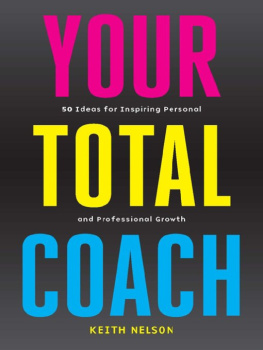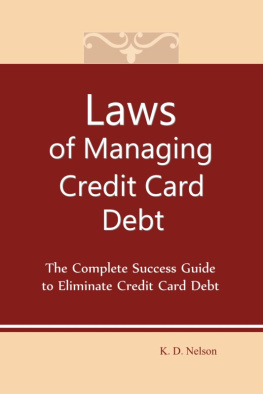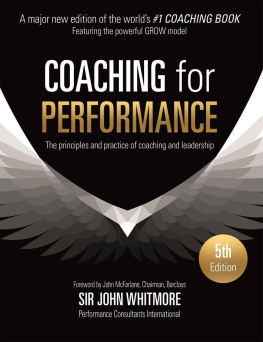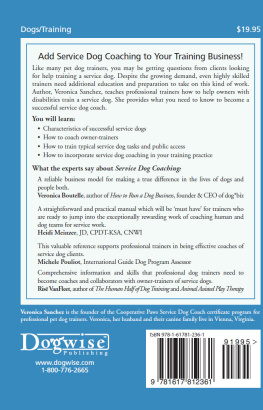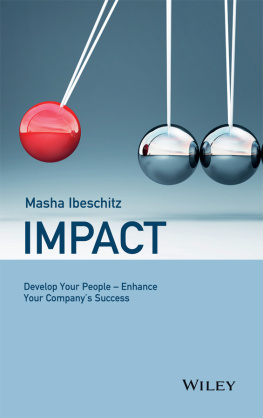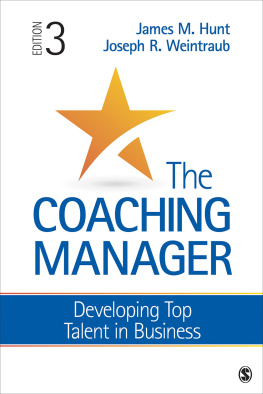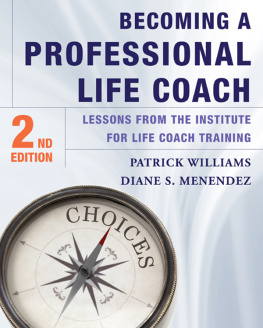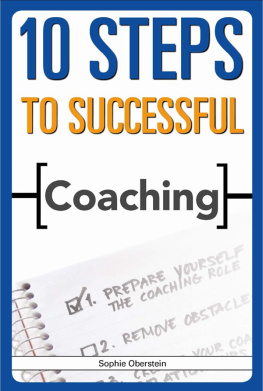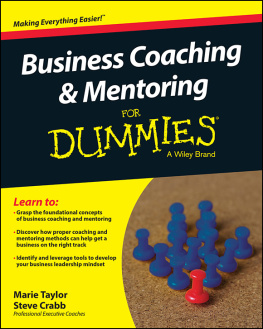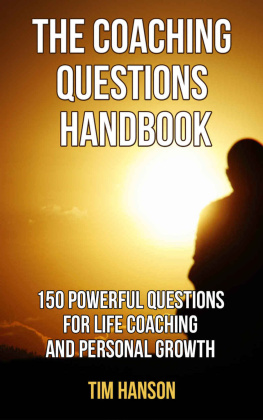YOUR
TOTAL
COACH
YOUR
50 Ideas for Inspiring Personal
TOTAL
and Professional Growth
COACH
KEITH NELSON
Copyright Keith Nelson, 2010
The right of Keith Nelson to be identified as the author of this book has been asserted in accordance with the Copyright, Designs and Patents Act 1988.
First published in 2010 by
Infinite Ideas Limited
36 St Giles
Oxford
OX1 3LD
United Kingdom
www.infideas.com
All rights reserved. Except for the quotation of small passages for the purposes of criticism or review, no part of this publication may be reproduced, stored in a retrieval system or transmitted in any form or by any means, electronic, mechanical, photocopying, recording, scanning or otherwise, except under the terms of the Copyright, Designs and Patents Act 1988 or under the terms of a licence issued by the Copyright Licensing Agency Ltd, 90 Tottenham Court Road, London W1T 4LP, UK, without the permission in writing of the publisher. Requests to the publisher should be addressed to the Permissions Department, Infinite Ideas Limited, 36 St Giles, Oxford, OX1 3LD, UK, or faxed to +44 (0) 1865 514777.
A CIP catalogue record for this book is available from the British Library
ISBN 978-1-906821-59-3
eISBN 978-1-907755-30-9
Brand and product names are trademarks or registered trademarks of their respective owners.
Cover and text designed by Cylinder
Typeset by Nicki Averill
Printed and bound in Great Britain by Bell & Bain Ltd, Glasgow
Welcome to Your Total Coach, a book that seeks to provide coaches with 50 inspiring ideas that can be used to both inspire personal and professional growth. These 50 ideas can be applied both to the coachs clients and to the coach himself. The coaching journey that sits at the heart of this book is one of discovery whether that is the coachs or the coachs clients. The 50 ideas are divided into three tiers of coaching, each representing growing personal development and professional growth within the coach. The more capable the coach, the more effective the coaching.
Your Total Coach is developed upon two fundamental principles that run throughout the three levels and 50 chapters.
Firstly, that coaching is focused upon raising performance. The goal of coaching is to raise performance. Whether it is applied in organisational, community, family or personal contexts, the concept of raising performance is used here as a very broad descriptor. It goes way beyond winning a cup or achieving a business target and extends to many different areas of life such as working with a client to:
Develop more effective interpersonal relationships
Define or redefine what he wants in his life
Raise personal confidence levels
Increase effectiveness at work
Make fundamental choices about lifes directions
The second principle is that successful coaching, leading to raised performance, is based upon psychological principles. Henry Ford said: If you think you can do a thing or think you cant do a thing, youre right. An outcome of performance-focused, psychologically-based coaching is the client going away from the coaching with a mindset that not only that he can, but he does!
Marianne Williamson explained: Our deepest fear is not that we are inadequate. Our deepest fear is that we are powerful beyond measure. Effective coaching can help the client to overcome fears to move away from the voice that says I cant.
Why this book?
The purpose of this book is to provide coaches with 50 ideas that will support and enhance their coaching. To provide structure and enable progress, the 50 topics are divided into three tiers. By dividing the coaching development into three distinct layers, the aim is to create an aspirational framework that supports coach development. These three tiers:
Are distinct. Each tier represents a different stage of coach development.
Overlap. These are broad categories and there are areas of overlap which are not mutually exclusive.
Are progressive. They represent development and progression.
Are intended as a framework.
Have performance improvement and psychological factors running through them as twin golden threads.
The three levels are:
TIER 1: SUCCESSFUL COACHING
TIER 2: ADVANCED COACHING
TIER 3: TRANSFORMATIONAL COACHING
For coaches who want to develop their practice and for would-be coaches wanting to enter the profession, the three tier coaching approach, which has been developed from training hundreds of coaches from around the world, provides a broad framework for effective practice, clear progression and sustained development at all levels of the profession.
While some authors have described differences in coaching such as skills coaching and development coaching, this approach does not distinguish between the two. Learning a skill and developing personally both involve raised performance and psychological factors to be effective.
I have been persuaded, encouraged and driven to create this approach for the following reasons:
Firstly, because of the ongoing challenges that coaches in training face when seeking to internalise what coaching is. Coaching requires much learning and unlearning, self-reflection, self-development and the capability to work in areas of enormous complexity and ambiguity. The journey that is described here seeks to describe the steps that coaches can take to integrate performance-focused, psychologically-based approaches into their practice.
Secondly, coachings dramatic growth over the last few years has largely been unregulated. There are many authentic coaches who act responsibly and voluntarily sign up to ethical codes of practice. Equally there are coaches whose approaches dont. In the right hands, coaching can be a wonderfully transformative, enhancing experience.
The three tiers
The three tier model seeks to lay the foundations for effective development that is designed to enable coaches in development to understand what coaching is about and to work professionally and ethically, delivering value to their clients.
TIER 1: SUCCESSFUL COACHING
Tier 1 focuses on many of the building blocks for coaching and are the basic essentials that enable effective coaching sessions to take place. They represent the core skills of coaching and without these in place, there would be limited development. These are also easily taken for granted.
Listening is one of these, and listening lies at the heart of all coaching. Most of us like to think were pretty good listeners, but as we explore in , real listening sometimes called effective, active or deep listening is real work. Students in practice sessions invariably report that even after a short 30-minute coach practice session, they are tired. As I said, listening is real work.
Coaching at this level encompasses listening and questioning, generating and giving feedback, goal-setting and understanding problem resolution. It means creating time and space, learning to hold back and not step in, understanding and applying models to help the process. (By tier 3 the confident and capable coach can let go of many of the tools learned in tier 1 goals dont need to be set, models dont need to be used.)
Fulfilling tier 1 status means that the coach is competent to conduct a coaching session. Businesses around the world are grasping the fact that reaching this level of competence isnt an option for their managers these days, its an essential. Why? Because effective coaching can achieve many things, including:
Raised performance;
A more positive working environment;
Helping people, teams and organisations navigate their way through a world in which there is less certainty and more rapid change than ever before. More and more people are working in roles that didnt exist a few years ago. There is no manual, no instruction book for success in the twenty-first century.
Next page
